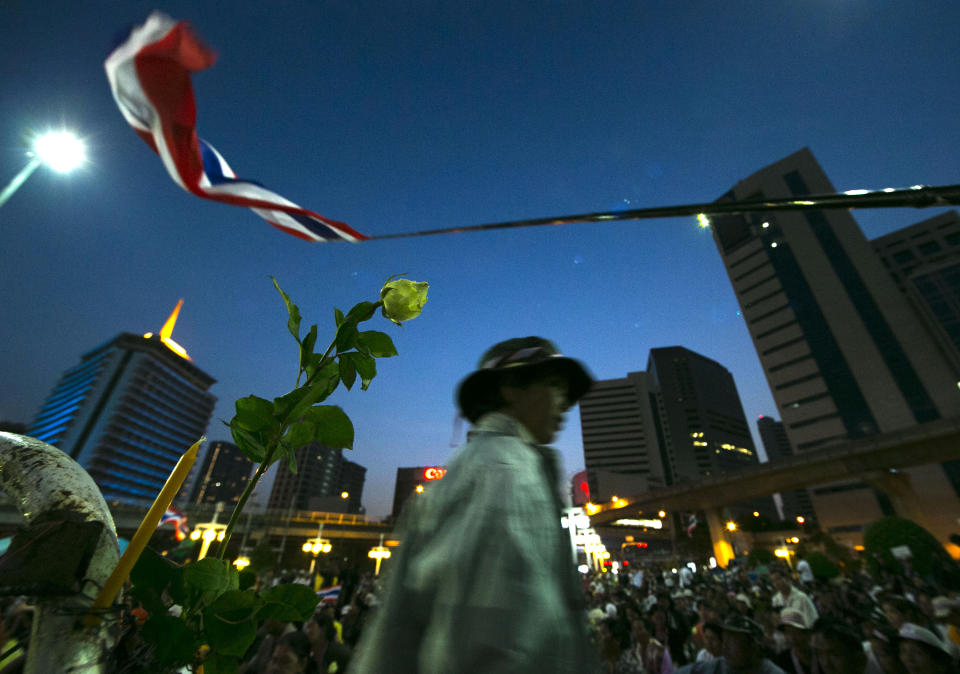Gun attack on Thai anti-gov't protesters wounds 1
BANGKOK (AP) — A gunman opened fire on anti-government protesters in Thailand's capital, severely wounding one man in the latest violence to hit Bangkok as the country's political standoff drags on, officials said Sunday.
The protesters, who control several small patches of the city, are vying to overthrow Prime Minister Yingluck Shinawatra's government.
The man was shot in the back before midnight Saturday in Bangkok's Lad Prao district, where protesters have taken over a key intersection. He underwent surgery at a hospital and was in an intensive care unit on Sunday, according to Bangkok's emergency medical center.
The shooting took place about 300 meters (yards) from a protest stage the demonstrators had set up, police Col. Komsak Sumangkaset said. The wounded man, 54, was a volunteer guard at a barricade tasked with checking vehicles and people entering the protest area, he said.
The protests, which are also aimed at derailing Feb. 2 elections that Yingluck called in a bid to quell the crisis, have been peaceful and Bangkok — a city of 12 million people — is calm. But assaults have been reported nightly, including shooting attacks at protest venues and small explosives hurled at the homes of top protest supporters.
On Friday, an explosive device hurled at a crowd of marching demonstrators in another part of Bangkok killed one man and wounded dozens of people. Police said the blast was caused by a fragmentation grenade.
It is unclear who is behind the unrest. But prolonged violence, even on a small scale, increases the chance that the military will stage a coup. Such a scenario would benefit protesters, who have called on the army to take sides and do not have the numbers to bring down the government on their own.
Thailand's army has staged about a dozen successful coups since the end of absolute monarchy in 1932.
The Southeast Asian nation has been wracked by repeated bouts of unrest since the military ousted Yingluck's brother, former Prime Minister Thaksin Shinawatra, in 2006 amid charges of corruption and alleged disrespect for the monarchy, which he denies.
The coup touched off a societal schism that in broad terms pits the majority rural poor who back the Shinawatras against an urban-based elite establishment supported by the army and staunch royalists who see Yingluck's family as a corrupt threat to the traditional structures of power. Yingluck's opponents — a minority that can no longer win at the polls — argue the Shinawatras are using their electoral majority to impose their will and subvert democracy.
The crisis boiled over again late last year after the ruling party attempted to push through an amnesty bill that would have allowed Thaksin to return from self-imposed exile. Thaksin has lived abroad since 2008 to avoid a prison sentence for a corruption conviction.
Anxious about triggering possible military intervention, Yingluck has ordered police to go out of their way to avoid confrontations with protesters. The strategy is aimed at averting violence, but it also has undermined rule of law and the government's authority, with police staying away from the scattered pockets of Bangkok controlled by demonstrators.
The protest movement has taken the law into its own hands. A protest leader, Issara Somchai, said demonstrators on Saturday had detained two men allegedly found with small homemade explosives and handcuffs.
Somchai said Sunday that the pair, suspected of planning violence, was still in the hands of protesters and was being "investigated."
"We are taking care of them. They are safe with us," said Somchai, adding that the men were also being protected from demonstrators who could seek revenge.



